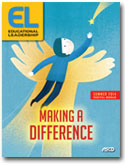One day, my son Daniel came home from kindergarten and told me, "I can't go back to school anymore because my teacher doesn't like me. How am I supposed to learn if she does not even care if I am there?"
I was surprised. I had thought that Daniel's school was a perfect place for him. It was the largest bilingual education English/Spanish elementary school in Arizona at the time, and Spanish was his first language. I was a 3rd grade teacher in the same school, and his sister was in 5th grade there. I even had a sitter in the neighborhood, so he didn't have to wait at school until I was finished with my teaching assignments each day.
What's more, Daniel's teacher was a friend of mine, and I knew she was a phenomenal educator. She had learned Spanish as a second language and was a strong proponent of teaching the whole child and honoring young people's private voices (their home language and casual speech) and developing their public voices (academic language and the language spoken in formal settings like clinics and offices). She was thrilled at the opportunity to build children's academic skills in at least two languages.
But for some reason, Daniel did not want to go back to school.
Outside the Classroom Door
Sometimes, children don't quite know what's making them uncomfortable or unhappy, and we adults have to figure it out. I wasn't sure what was going on, but I had an idea. My classroom's windows faced Daniel's classroom door across the courtyard. The next morning, I watched as students walked into that classroom.
And I saw the problem right away.
The classroom management training we teachers had attended at the beginning of the school year had stressed that we should greet our students at the door every day, welcoming them to our class. Daniel's teacher was standing at the door all right, but she was conversing with the kindergarten teachers on either side of her classroom. Instead of actually greeting the students, they were holding a grade-level meeting first thing in the morning.
As I watched, my son attempted to get his teacher's attention, but she did not even see him. Frankly, it broke my heart. I am a mother first, and a teacher second.
Daniel was raised in both the United States and Mexico. He was taught to greet adults when he first saw them during the day. Although he was shy, it had been ingrained in him that he had to make that traditional contact just once, and then he could go back to being a kid. When the teacher did not return his greeting or look at him, he must have believed it was because she did not like him.
In Mexican culture, the saying is El saludo no se le niega a nadie—which translates to "The greeting is not denied to anyone." In other words, no matter what you think or feel about another person, you must return his or her greeting. It is the "educated" thing to do. At home, one has to give el saludo every time someone drops in, or walks by—even the people who live with you. At school, the exchange of el saludo with the teacher marks the daily transition to being a student.
Daniel's kindergarten teacher was not a Latina, but she was brought up in Tucson, and she had learned the Spanish language. She loved working in the Latino community. When I told her the problem I had observed, she was mortified. She had not known about el saludo, and she thanked me profusely for opening her eyes to a part of the culture she was not familiar with. She feared she might have offended other students along the way simply because she had not known about this gesture.
I never checked up to see whether Daniel's teacher had changed her behavior at the classroom door, but by the end of the week, my son loved school again. Later on in the school year, he even starred in the kindergarten play. He never mentioned not liking school again.
A Cultural Disconnect
In Latino culture, traditional etiquette is passed down by parents and the community, not through schooling. But the expectation is that schools support the social etiquette standards of the community.
I have worked with Latino students from preschool to university levels, and I've observed that when teachers do not take the time to greet their Latino students (or students from other cultures with similar etiquette rules), many of these students conclude that these "un-greetful" teachers are not proper authority figures. As a result, some Latino students may begin disconnecting themselves from school because they feel invisible to the adults around them. Some even become involved with gangs as they look for a community that accepts them—a culture where they are visible.
I was brought up within both the Mexican and the United States cultures. I greet everyone, including young Latinos, when I meet them for the first time each day. Some seem surprised that I acknowledge them. Some do not return the greeting, perhaps because they have been hardened after not having been greeted properly for years. But most young Latinos return the greeting respectfully and with a smile. My daughter Melisa says she loves to greet a group of Latinos because, even if some of them would like to appear cool or aloof, they usually respond in unison.
A friend who volunteers her time working with homeless people told me that most of the homeless people she meets are surprised when she looks them in the eye, greets them, and extends her hand to shake theirs. She spoke of one man who asked her, "Are you speaking to me?" while looking around. He told her, "I didn't think you could see me. Most people just walk by as though I was not here."
I imagine many Latino youth and young people from other communities and cultures in which exchanging greetings is important feel the same way. They must lead a double life—learning to keep their distance with adults at school, but becoming connected and cross-generational again when they go back to their home communities. And it simply stems from el saludo.


